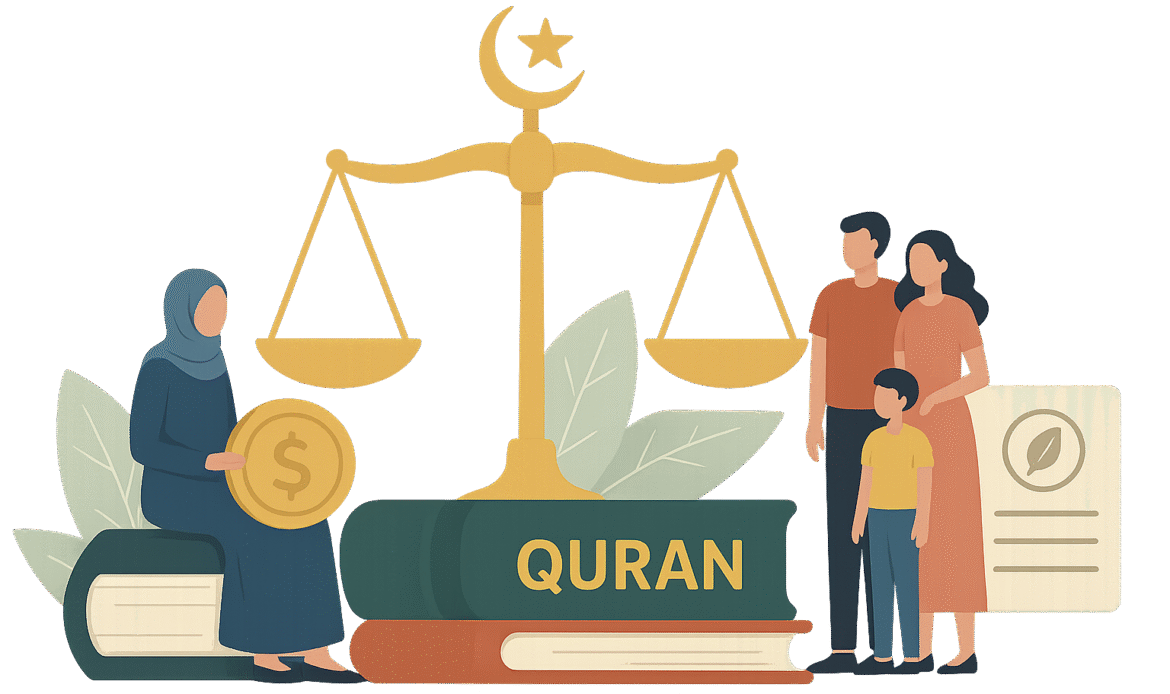The Role of Sharia Law in Structuring Valid and Contest-Proof Wills
- Go Lawyers
Sharia Law - Ensuring Compliance and Certainty in Islamic Estate Planning
Sharia law plays a significant role in guiding how Muslim individuals structure their wills and manage inheritance. Rooted in the Quran and the Hadiths, Sharia law outlines clear rules on how an estate should be distributed, ensuring that the process aligns with Islamic values.
For Muslims, creating a will that complies with Sharia law is not only a legal matter but also a spiritual responsibility. It reflects a commitment to justice, fairness, and the religious duty to care for one’s family even after death.
Understanding the principles of Sharia law and how they apply to wills helps ensure that the distribution of assets is valid, respected, and less likely to be contested. This includes the concept of wasiyyah, or Islamic will, which allows a person to make specific bequests while following prescribed inheritance shares. Whether you’re planning your estate or advising someone on their options, knowing how Sharia law applies can provide clarity and peace of mind.
WHAT MAKES A WILL TRULY ISLAMIC
A valid Islamic will respects Qur'anic inheritance rules, allocates the discretionary one-third properly, and avoids clauses that conflict with Shariah.
STRUCTURING A COMPLIANT WAQF THROUGH YOUR ISLAMIC WILL
Muslims can create a lasting charitable legacy through a Waqf, funded via the wasiyyah, with full legal backing and scholarly certification.
AVOIDING CONTESTATION: A SHARIAH-COMPLIANT LEGAL STRATEGY
Integrated safeguards—like calculated shares annexures and scholar endorsements—help reduce legal disputes and ensure your wishes are honoured.

What is Sharia Law?
Sharia law is a set of principles derived from the Quran and the Hadiths, which are the sayings and actions of the Prophet Muhammad. It covers all aspects of a Muslim’s life, including family, finance, and inheritance.
These principles provide a comprehensive guide to living a life that is in harmony with Islamic values. When it comes to wills, Sharia law outlines specific rules on how an individual’s estate should be distributed after their death.
This legal framework ensures that the distribution process is carried out justly and by divine injunctions, which is of paramount importance to practising Muslims. In addition to inheritance, Sharia law encompasses a wide array of legal and ethical aspects, making it a holistic approach to life management for Muslims.
The Concept of Wasiyyah
The term "wasiyyah" refers to an Islamic will. It is a legal document that specifies how a Muslim's estate should be distributed according to Sharia principles. The wasiyyah ensures that the distribution of assets is carried out fairly and in accordance with Islamic teachings. This not only reflects the personal wishes of the deceased but also upholds the spiritual obligations set forth by their faith. The concept of wasiyyah is deeply ingrained in the Islamic tradition and is a testament to the faith's emphasis on justice and equitable treatment of heirs. Furthermore, the wasiyyah allows for the inclusion of specific instructions and bequests that align with the testator's personal and religious values, ensuring that their legacy is preserved in a manner they deem fitting.
- let’s navigate your path forward together.
Need Clarity on Sharia Law Wills? We’re Here to Guide You.
Get reliable legal and religious advice on Sharia Law from experts. Honour your faith and secure your estate with confidence.
Key Elements of an Islamic Will
Quranic Inheritance Rules
Under Sharia law, the Quran specifies the shares of inheritance that certain heirs must receive. This includes immediate family members such as parents, spouses, and children. These rules are designed to ensure a fair and balanced distribution of wealth, reflecting the importance of family and community in Islam. The Quranic inheritance rules are strict and must be followed to ensure that a will is valid under Islamic law. Adhering to these rules not only fulfils religious obligations but also fosters familial harmony by preventing disputes over the estate. The clarity of these rules offers a structured approach to inheritance, which is beneficial in maintaining order and justice within the family unit.
Fixed Shares
One of the distinguishing features of an Islamic will is the concept of fixed shares. This means that certain relatives have predetermined shares in the estate. For example, sons typically receive twice the share of daughters, and parents and spouses also have specific entitlements. These fixed shares must be adhered to when drafting a will according to Sharia law. This system of fixed shares ensures that each eligible family member receives their rightful portion, reflecting the Quranic emphasis on fairness and balance. By following these guidelines, the potential for familial discord is minimized, as the distribution is transparent and based on religious doctrine.
Discretionary Bequests
Beyond the fixed shares, an individual can allocate up to one-third of their estate to other beneficiaries through discretionary bequests. This allows for some flexibility in the will, enabling the testator to provide for non-heirs, charities, or other individuals who may not be entitled to a fixed share. This aspect of Islamic wills demonstrates the religion’s recognition of individual preferences and the importance of charity and community support. The discretionary bequests offer a way to address unique family situations or to support causes that align with the testator’s values, allowing for a personalised touch within the framework of Sharia law.
The Benefits of a Sharia-Compliant Will
Ensuring Compliance with Religious Obligations
For Muslims, adhering to Sharia law when creating a will is not just a legal requirement but also a religious obligation. A Sharia-compliant will ensures that an individual’s assets are distributed in a manner that aligns with their faith, providing peace of mind that their religious duties have been fulfilled.
This compliance is a reflection of one’s devotion and commitment to their faith, underscoring the importance of integrating religious principles into all aspects of life. Moreover, a will that adheres to Sharia principles is seen as an act of worship, reinforcing the spiritual significance of fulfilling one’s duties towards God and family.
Reducing the Risk of Disputes
By following the clear guidelines outlined in Sharia law, an Islamic will can help reduce the risk of disputes among heirs. When the distribution of assets is predetermined and transparent, it minimises the potential for conflicts and legal challenges after the individual’s passing. This clarity fosters a sense of trust and security among family members, knowing that the estate is being handled in a just and equitable manner.
Additionally, a Sharia-compliant will serves as a legal safeguard, reducing the likelihood of external interference or contestation that could otherwise arise from ambiguities in estate distribution.
Providing for a Diverse Range of Beneficiaries
Through discretionary bequests, a Sharia-compliant will allows for the inclusion of a broader range of heirs and beneficiaries. This flexibility ensures that individuals can provide for loved ones, charities, or other causes that are important to them, within the bounds of Islamic law. This aspect is particularly beneficial in modern contexts, where family structures and personal affiliations may extend beyond traditional norms.
By accommodating a diverse range of beneficiaries, a Sharia-compliant will reflects the testator’s broader social and ethical commitments, ensuring that their legacy supports a variety of meaningful initiatives and relationships.
Drafting an Islamic Will in Australia
Legal Considerations
In Australia, Muslims can draft wills that comply with both Sharia law and Australian law. It is important to note that while Sharia principles can guide the distribution of assets, the will must also meet the legal requirements of Australian law to be considered valid.
This necessitates a careful balance between religious obligations and local legal standards, ensuring that the will is enforceable in the jurisdiction where it is executed. Understanding the nuances of both legal systems is crucial in crafting a will that honors the testator’s wishes while adhering to statutory requirements.
Engaging Legal Experts
To ensure that an Islamic will is both Sharia-compliant and legally valid in Australia, it is advisable to engage legal experts who specialize in this area. These professionals can help navigate the complexities of both legal systems and draft a will that respects the testator’s religious beliefs while meeting legal standards.
Legal experts in this field possess the knowledge and experience necessary to reconcile any potential conflicts between the two systems, providing valuable guidance and peace of mind to the testator. Their expertise is instrumental in ensuring that the will is not only compliant but also optimized for the testator’s specific circumstances.
The Role of Islamic Organizations
There are several Islamic organizations in Australia that offer guidance and support for drafting Sharia-compliant wills. These organizations can provide resources, advice, and connections to legal experts who understand the intricacies of both Sharia and Australian law.
By leveraging the knowledge and support of these organizations, individuals can gain a deeper understanding of their obligations and options, ensuring that their will is comprehensive and well-structured. Furthermore, Islamic organizations often engage in community outreach and education, helping to raise awareness about the importance of Sharia-compliant estate planning among the Muslim community.
Conclusion
Structuring a valid and contest-proof will is a critical aspect of estate planning for Muslims. By adhering to Sharia law, individuals can ensure that their assets are distributed in accordance with their religious beliefs and reduce the likelihood of disputes among heirs. Whether in Australia or elsewhere, engaging knowledgeable legal experts and Islamic organizations can assist in creating a will that fulfills both religious and legal obligations. Taking these steps not only provides peace of mind for the testator but also helps secure the future for their loved ones. A well-crafted will serves as a testament to one’s faith and values, ensuring that their legacy is preserved and respected for generations to come.
- Expert Mediation Services
Find Resolution, Not Conflict
Disputes don’t have to lead to lengthy court battles. At Go Lawyers, our mediation lawyer services provide a practical and efficient way to resolve conflicts. Our experienced team fosters constructive dialogue to achieve fair and mutually beneficial outcomes, whether it's family mediation, business disputes, or transactional issues.
Let us guide you toward a solution that prioritises your interests while preserving relationships.
- Why Choose Go Lawyers?
Professional Lawyers who offer a fixed, fair price
Whether you are an individual, a business owner, or part of a giant corporation, our experienced team delivers solutions that protect your interests and drive results. From drafting contracts and negotiating agreements to resolving disputes through mediation or litigation, we handle every aspect of your legal needs professionally and carefully.
We understand the importance of clear communication and cost-effective services, so we prioritise transparency and efficiency. Our team possesses expertise in risk management, compliance, and the resolution of commercial disputes, allowing you to depend on us as a reliable partner throughout the entire process.
